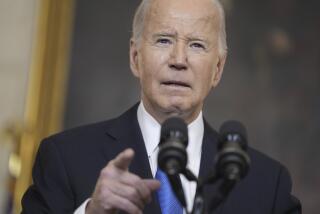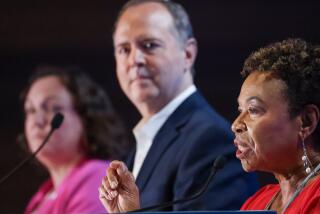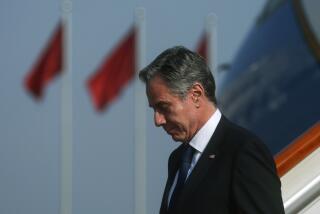Shultz, Dodd Clash Over Senator’s Latin Visits
- Share via
WASHINGTON — Secretary of State George P. Shultz, in a bitter exchange Tuesday, publicly scolded a leading Senate opponent of aid to the Nicaraguan rebels for having “intruded” in the conduct of U.S. foreign policy in Central America.
The confrontation between Shultz and Sen. Christopher J. Dodd (D-Conn.) demonstrated just how divisive the contra aid issue has become since members of Congress learned that Reagan Administration officials had diverted to the rebels profits from the sale of arms to Iran.
Shultz, in testimony before the Senate Foreign Relations Committee, charged that Dodd had undermined the “sense of cohesion” in U.S. foreign policy by meeting recently with the leaders of Costa Rica, Honduras and Nicaragua without a U.S. ambassador present.
Dodd, chairman of the Senate Foreign Relations subcommittee on Latin America and a principal sponsor of legislation to halt aid to the Nicaraguan guerrillas, replied that Shultz is trying to “intimidate” him, as well as those leaders in Central America who oppose assistance to the contras. He said that private meetings with Central American leaders are often the only way to get “honest answers.”
The Democratic-controlled Congress is likely to vote soon to halt aid to the contras, but Dodd and other opponents of the policy have acknowledged that they probably do not have enough support to override a veto of the legislation by President Reagan.
Although State Department officials usually object whenever members of Congress try their hand at international diplomacy, the situation in Central America has vastly expanded the debate over congressional intrusion in foreign policy. Dozens of Congress members have traveled to the region in recent years, and many have come back challenging the Administration’s contention that Central American leaders support U.S. policy there.
Shultz Raises Issue
Shultz raised the issue when Dodd asked the secretary for access to cable messages from the Central American embassies that he believes might demonstrate opposition to a recent regional peace initiative launched by President Oscar Arias Sanchez of Costa Rica.
“I think we are getting into a real problem in the conduct of foreign policy of the United States because it is being intruded into in all sorts of ways,” he said to Dodd. “And frankly, senator, I want to confront you on this subject.”
He said that the exclusion of U.S. ambassadors from such meetings undermines their credibility in the eyes of foreign officials. “It has an impact on their judgment of the United States, on whether they think the ambassador is worth dealing with,” he said. “It has an impact on the dignity of our country.”
The secretary noted that providing support for the Nicaraguan resistance movement is still the official policy of the United States, which was approved last year by Congress.
“You are going around telling people it’ll be different, but nevertheless there is a policy of the United States government, and I think we’re entitled to represent it and not to have foreign leaders constantly told: ‘Well that’s what the ambassador tells you is the policy, but I want to tell you, Congress has a different idea.’ ”
Dodd strongly objected. “The implication that we are trying to conduct foreign policy because we have meetings with heads of state is, I think, a step that goes far beyond what the executive branch ought to suggest,” the senator said.
Dodd said he will continue to press for access to cables to determine whether the State Department is discouraging the new peace initiative. “I cannot believe my ears when I hear you saying a committee chairman would be discouraged from meeting with heads of state,” he added.
Shultz then acknowledged that he was not forbidding members of Congress to hold private meetings with heads of state. “It is not a directive,” he said.
More to Read
Sign up for Essential California
The most important California stories and recommendations in your inbox every morning.
You may occasionally receive promotional content from the Los Angeles Times.










